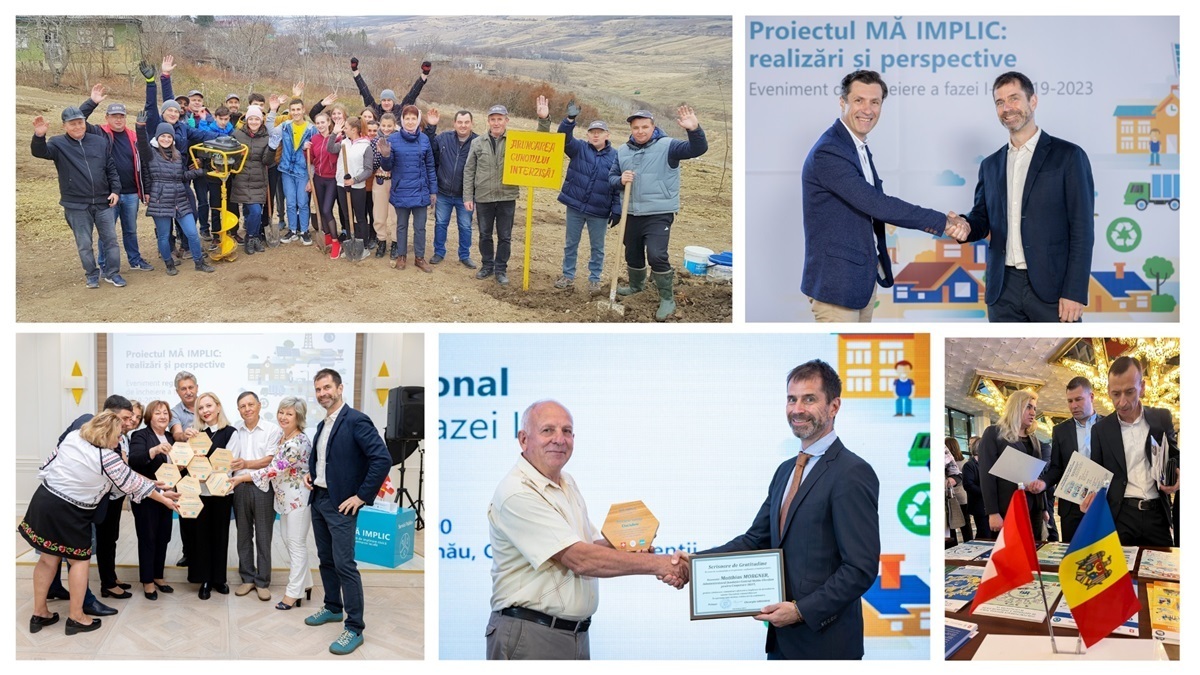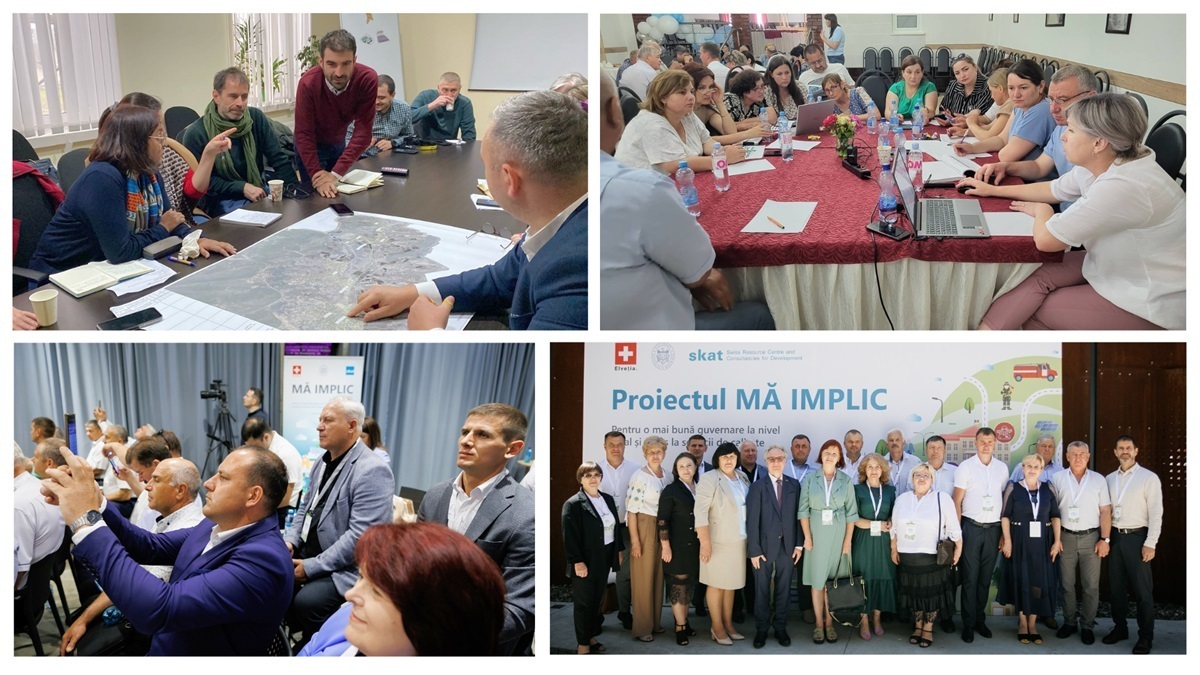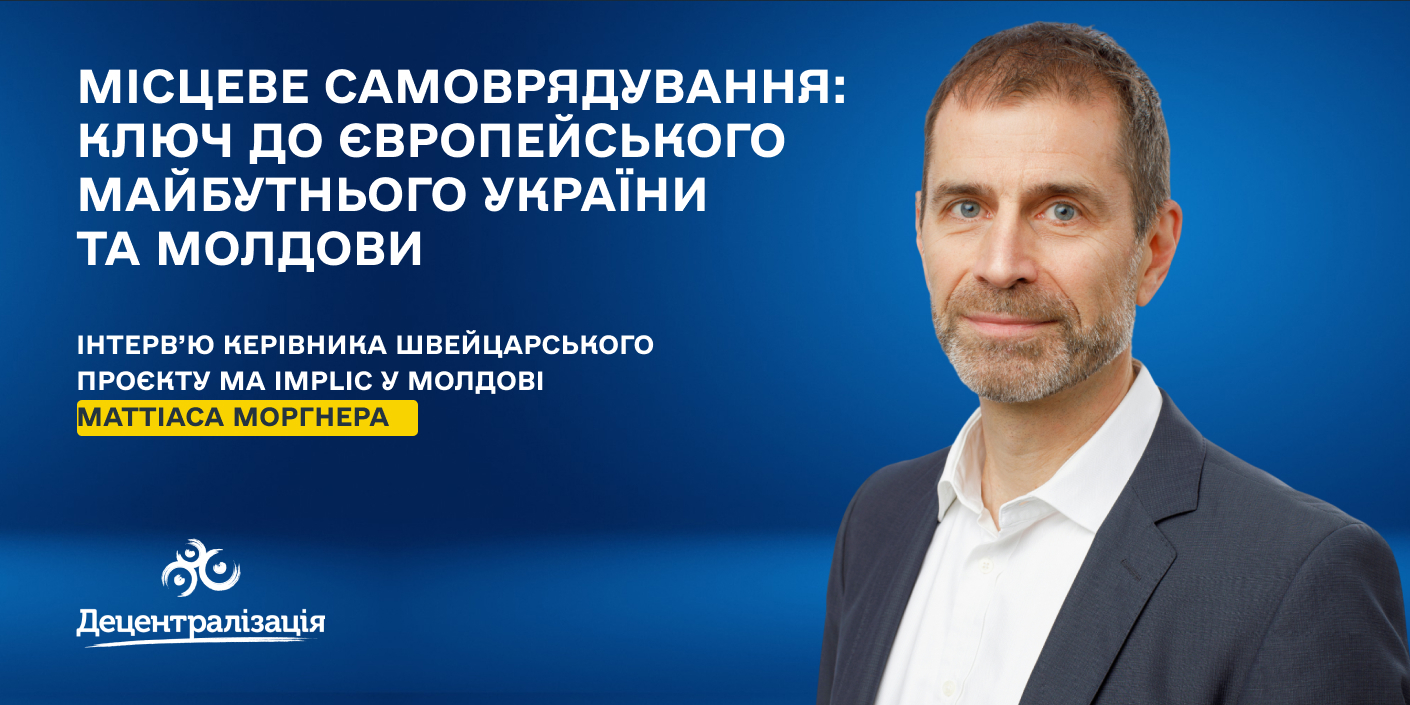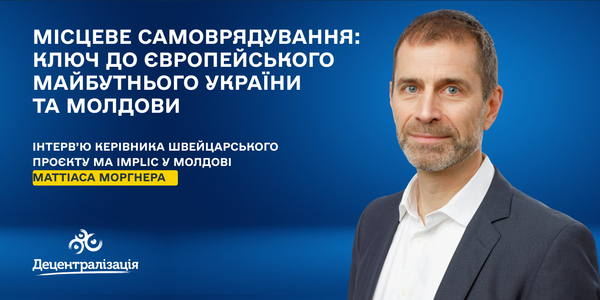Local Self-Government: The Key to the European Future of Ukraine and Moldova. An Interview with Matthias Morgner
Matthias Morgner is an expert with 20 years of experience in public sector reform across Eastern Europe. His unique perspective is shaped by his years of work supporting decentralisation, regional development, and strengthening local self-government in Ukraine and Moldova. As the head of the Swiss project Ma Implic in Moldova, he actively drew on the experience of the Swiss-Ukrainian project DESPRO, which assisted Ukraine in shaping and implementing the tasks of local government reform and the decentralisation of powers from 2008 to 2021.
In an interview with the Decentralisation portal, Mr Morgner discussed the similarities and differences in the reforms in Ukraine and Moldova, the impact of war on reforms in Moldova, the role of communities in the development of local self-government, and the importance of local reforms for European integration.
This is a conversation about the challenges, successes, and prospects that open up for Ukraine and Moldova in the process of building effective local governance.
Comparison of reforms in Ukraine and Moldova
- What are the main similarities and differences between the local self-government reforms in Ukraine and Moldova?
The main similarity between the reforms in both countries is the starting position and the objective: in both countries we have – or had in the case of Ukraine – too many, too small, too weak municipalities, especially in the rural areas. And in both cases what the governments want is to have stronger municipalities which are able to provide good conditions for the people who live there. Good quality public services, a friendly, clean and safe environment and conditions which make it attractive for business to create jobs and to pay taxes. A crucial element in getting to this objective is, in both countries, the amalgamation of smaller municipalities to bigger ones. From this perspective, the reforms in both countries are, indeed, very similar.
The differences are more on the technical level: the starting conditions are different, municipalities in Moldova have, technically, more autonomy than they used to have in Ukraine prior to 2014/15. In theory, this includes also local budgets. This means that the incentive which the government has to offer – granting more fiscal autonomy to LPAs which are ready to reform – is less strong in Moldova. Another difference is in the history of such reforms: when in Ukraine, if I am informed well, no attempt to reform had been undertaken prior to 2014 then Moldova had seen two or three such attempts since gaining independence. They were partly successful but then reversed – which is not ideal when you want to motivate people that “this time it will work”.
Again, these differences are rather technicalities. They matter for those who are designing and supporting the reform. The main idea, and the main objective are the same.
- How did DESPRO's experience in Ukraine help you implement the Ma Implic project in Moldova? What specific approaches were adapted?
The Ma Implic project in Moldova was, indeed, designed very much along the lines of the DESPRO project. The approach to put the project “on two legs”, this is to show on very practical examples that strengthening local self-government brings tangible benefits for the people on the one side, and to give the project a strong mandate to support the government in designing and implementing the LG reform on the other side, has proven successful in the case of DESPRO. The same approach was used for Ma Implic. This was a smart decision by the donor, the Government of Switzerland. It also helped a lot that the same organisation, SKAT, which has implemented DESPRO is now implementing the Ma Implic project. The Ma Implic team benefitted greatly from a visit which we made to Ukraine in summer 2021. We have visited Snitkiv, Tulchin and Novoborivska OTH to see the positive effects of the decentralisation reform. In Kyiv then we met with the DESPRO team, and also with Mr Nehoda and Mr Tkachuk – and I think it is fair to say that this visit has really provided a completely new perspective to the Ma Implic team. We have then also continued the exchange in autumn and winter of 2021/22 when two DESPRO experts worked with us in Moldova for several weeks. We would have loved to continue this exchange in this format but the beginning of the full-scale war, obviously, put an end to this for of cooperation. We are happy that we can still call or write to our DESPRO colleagues to ask them questions, and I can tell you that the Law on voluntary amalgamation in Moldova which was adopted in late 2023 was drafted with the Ukrainian experience very closely studied!

Working meetings within the framework of the group of advisers on the implementation of the state regional policy in Ukraine of the U-LEAD with Europe Programme
- How did the war in Ukraine affect the local government reform in Moldova? Have the priorities changed?
Honestly, not much. Sure, when the current government of Maia Sandu’s PAS party took office in 2020 they first had to struggle with the effects of the COVID pandemic (does anyone remember that??) and then, in 2022, the priority was to keep Moldova safe and stable, to manage an enormous number of refugees from Ukraine and then to manage an energy crisis and a resulting inflation of up to 30% in winter 2022/23. A reform of local self-government was simply not the highest priority at that time – although the government clearly understood that something had to be done! This delay had cost precious time. Not only in terms of starting 3 years later, the problem was that the next election cycle was approaching fast – first the local elections in autumn 2023, then presidential elections in 2024 and next are the parliamentary elections in 2025. And you don’t want to start a reform which is a pretty emotional one, a reform which will trigger a lot of scepticism and resistance when you have 3 elections ahead of you.

The Project on Civic Engagement in Local Governance “MA IMPLIC” supports the development of municipalities at both the national and local levels
European integration through reforms
- Why is the local government reform a key condition for Ukraine and Moldova's approximation to the European Union?
I’m not sure it is a key condition. EU accession criteria are much more strict and detailed in other areas. But! It would be a mistake to think that local government reform is of lesser importance and can be pushed to the second tier because there are no such super strict and detailed accession criteria. The importance is in the result, or the purpose of local government reform. What is needed to access to EU and to reap the benefits of EU membership is an effective, well-functioning public administration. For the citizens, the story of the benefits of EU accession often goes like this: better jobs, better salaries, better infrastructure, safety and stability. But this is nothing which “Brussels” brings to Balti, Badiceni, Brody or Bilhorod-Dnistrovksy. The EU funds, the EU programs, the EU standards – most of this will be brought to the people in these and all other towns and villages by the local and regional governments. EU accession needs very smart and committed people working at government level. But only with a better functioning local government Ukraine and Moldova will be able to fully enjoy the advantages of EU membership.
- How do you assess the interdependence of the situation in local government in the two countries in the context of their European integration?
I think - and I wish - that there was even more exchange and mutual support in this. Maybe it’s yet too early, and the war certainly doesn’t help to increase exchange, joint projects and shared initiatives. It is for a variety of reasons that the LG practitioners and experts from Moldova rather look to Romania or to smaller EU countries like Estonia for advice and inspiration, in the same way as the colleagues from Ukraine would rather exchange with their peers from, say, Poland. And it would be a mistake to ignore these preferences and established ties. But I do think there is a lot of untapped potential for cooperation and mutual benefit in local and regional government and development between Moldova and Ukraine which share not only the same time-line for EU accession but are connected by geography, infrastructure and, at least to some extent, also by history and language.


One of the important objectives of the MA IMPLIC project is to build cohesion and develop skills for joint problem-solving and cooperation both within and between municipalities
The role of communities in development
- As part of the Ma Implic project, you support 14 groups of local public authorities. What key results have been achieved?
Let me talk about the 30 partner villages, and specifically the 10 groups of LPA which the Ma Implic project has supported between 2020 and 2023. The 14 groups you mention are our partners for the current project phase and I will be happy to talk about these results in 2027! The most impressive result of our support to local government in Phase 1 was that these LPA managed to secure investments from other sources in an amount of ca. 3.6Mio Euro in addition to the 2Mio Euro which the project provided and the 1Mio Euro which the local governments and citizens contributed from their own sources. This means that the local governments managed to develop projects which are technically solid, accepted by the local communities, in line with local development plans and presented and explained by local public servants who “own” the projects and understand their value for the development of their communities. Another big success was that in 9 of these 10 LPA groups the mayors, local councilors and the population agreed to collaborate and to share the responsibility for joint service delivery. In that period nobody was really promoting such collaboration between LPA and there were quite a few influential people who were fiercely advocating against this idea. Our local partners have shown that cooperation is possible and brings benefits.
- How does public participation affect the effectiveness of local government? What practices have been most successful?
Citizen participation is very important for the Ma Implic project. In fact, “ma implic” means “I engage”. One of the things we have heard most often from our partner mayors at the end of the first project phase was that the project has helped them to consult the people, to not be afraid of their criticism and rather to see the population as an asset, as a resource to find, agree and then implement big tasks. In most of our local level projects the funding was not sufficient to provide water supply or street lighting for the entire village, in many cases everyone wanted to have a well-functioning waste collection service – but far less people were ready to pay for this. By discussing publicly and with as many people as possible and agreeing a compromise the solution implemented was accepted by the majority. In the end of the day, this is democracy – it's not “the mayor is responsible, he or she shall do”, and its also not a consensus where everyone gets what he or she wants. Democracy is finding a compromise and public participation at local level is the basis for this.
- How can optimisation of administrative and communal services contribute to community resilience?
Well, again, resilience and better living conditions is not to have best quality of public services, in every village no matter how big or small with, ideally, cheap tariffs. This is not sustainable. We have many cases in western Europe where smaller municipalities built over-dimensioned facilities, often this affects waster-water treatment plants. What happens after a couple of years is that costs run out of control which then leaves two options: either to increase the tariffs and the service becomes very expensive, or to subsidise this from the local budget which then has not enough money left to finance the kindergarden, to repair roads or to keep the youth or culture center open. So, technically sound planning paired with extensive communication and public consultation secures long term sustainability of the service provision – which, in the end, means that people are happy to live in the community.
Creating conditions for the provision of quality public services to the population of municipalities is also an important component of the MA IMPLIC project's activities
Prospects for regional development
- In your opinion, what are the main conditions for successful regional development in Ukraine and Moldova?
I think it begins with the acceptance and understanding of the concept of “regional development” in the European understanding of it. When the EU says “regional development” then this is so much more than limited to administrative-political or statistical units. Regional development aims to “glue the territory and the society of Europe together” (cohesion policy), regional development aims to foster economic development which is specific to the unique strenghts, potential and limitations of different types of territory. And then there is that aspect of a balanced development across all regions, in the sense of not leaving certain areas behind which are in a less favourable location, have a difficult track record of transitioning their economy. To consider this sub-national, regional perspective of social, economic and intellectual development the EU makes available significant amounts of funding. “Regional development policy” is an enormous investment program. When I was working in Ukraine on this topic what I observed very often, however, was that “regional development” was equaled with “the oblast level”, as something in addition to the national level and the local self government. But this is not enough! To follow up on that earlier question about the links between Moldova and Ukraine let me mention the southern part of Odesa oblast. They have so much potential for regional development together with the south of Moldova, and also the lower Danube regions of Romania. Whereas the northern part of Odesa oblast might be better advised to explore potential development of infrastructure or economic development together with other parts of central Ukraine. The administrative (in this case even: national) borders are clearly not the best suitable categories in this case to explore the potential which these regions offer if we begin to look at the concept of “regional development” from various perspectives. So, to answer your question: the number one condition for successful regional development is to develop a broader understanding and acceptance of the concept of regional development and then to educate and train competent specialists which can make the most out of what the EU has to offer for Regional Development in Ukraine and Moldova, in my view.
- How can communities use international experience and support to improve local governance?
Oh, this is one of the most interesting questions which people like me, who work in international development projects, ask ourselves on an almost daily basis. Of course, we draw on experience from other countries when designing policies, drafting legislation, implement tools for many activities and processes. There’s no sense in reinventing the wheel. And study visits to other countries can be enormously motivating. But no matter how classy and how inspiring these international examples are – in the end of the day every situation is unique, every local community has their specific needs, expectations, strengths and limitations. And the job needs to be done locally. And when the international support is too active in doing it for you, instead of you, then you never learn doing it yourself. This is a very fine line to walk here. In the projects where I am working I very much try to encourage the local communities and their leaders to see our international, project support really as support to their projects. I want a mayor to present a project as the project of the local community, not as a project of the donor project XY. This is very important in the context of citizen participation and sustainable local development about which we spoke earlier.
Personal views and the future of reforms
- Your colleagues call you a patriot of Ukraine. What inspires you most about the local government reform process in Ukraine?
Wow, that is a great word! But yes, it is true – I have worked in Ukraine for many years, I have many friends there and since the start of this most unjust full-scale war it is simply not possible not to be sympathetic with Ukraine. I follow the developments in Ukraine very closely and try to help where I can. The most inspiring and rewarding lesson from the decentralisation reform in Ukraine was when, especially in 2022, we have seen that Ukraine was able to resist the aggression precisely because of the experience and the will to take things in their own hands at the local level! This is what it is all about. In more technical language we call this local self-government but with a slightly broader perspective this is freedom and independence.
- How do you envisage the future of local self-government in Ukraine and Moldova in 5-10 years? What are the key challenges to be overcome?
Difficult question... the tendency towards urbanisation is a big challenge, not only in Ukraine or Moldova. More and more people move to the bigger cities and the rural area is struggling everywhere with the challenge to offer attractive infrastructure and public services to the people who live there. But Moldova and Ukraine still have a lot of potential to develop the rural areas to become attractive regions with specific strengths. And in an area where, say, tourism, or a specific economic cluster thrives people will also want to live. And then the local self-government has the motivation to become better, more effective, more responsive to people’s needs. We are currently observing a good level of development of local self-government, this means improving the public sector, the administration. The next step which needs to follow now is to think “development” in this context. We need this smart specialisation, local and regional development to unlock the potential which a better local self-government offers.
The Project on Civic Engagement in Local Governance “MA IMPLIC” implemented by Skat Consulting Ltd., financially supported by the Swiss Agency for Development and Cooperation (SDC), aims at improving the local governance system in Moldova.

04 March 2026
Львівська агломерація і Метрополія Ґетеборгу (Швеція) заклали основу для довгострокового партнерства
Львівська агломерація і Метрополія Ґетеборгу...
Перспектива розвитку метрополій, які у нас більш звично називати агломераціями, останнім часом привертає до себе все...
04 March 2026
Кращі практики на старті: як Центри...
Старт нових сервісів психосоціальної підтримки в умовах війни завжди є викликом. Обмежені ресурси, інфраструктурні...
04 March 2026
Helvetas проводить відбір ТГ Харківської області для забезпечення мешканців житлом
Helvetas проводить відбір ТГ Харківської...
В межах проєкту «Horizon Homes: сталий модульний житловий проєкт в Україні», що впроваджується швейцарською...
04 March 2026
Снігурівська МВА підписала першу угоду про партнерство з данським муніципалітетом Гентофте
Снігурівська МВА підписала першу угоду про...
Снігурівська міська територіальна громада розпочинає новий етап міжнародної співпраці. Начальник Снігурівської...

